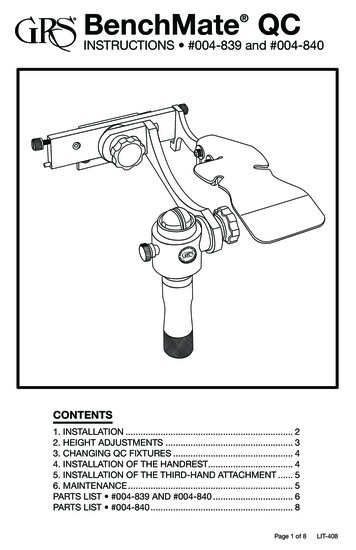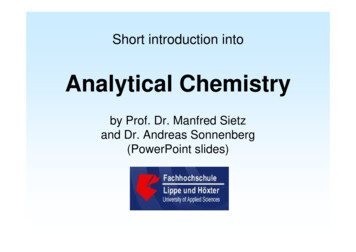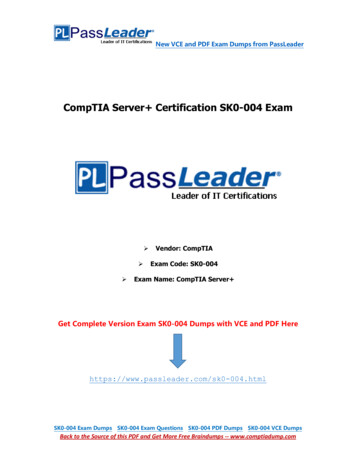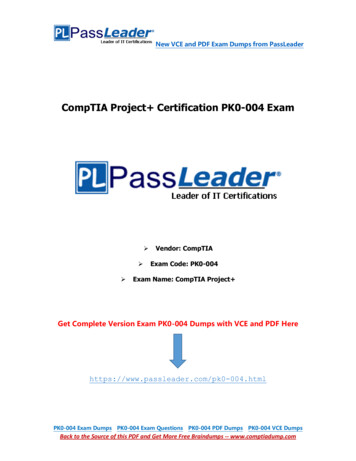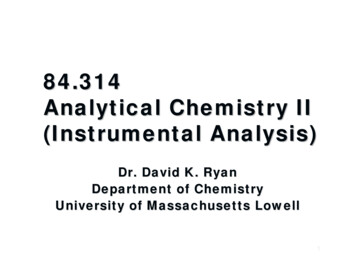
Transcription
Analytical Chemistry ICourse # 004:111:0001 or Betsy StoneChemistry Building W376Tel. (319) 384-1863betsy-stone@uiowa.eduInstructorOffice Hours11:30 – 1:00pm Monday and FridayBy appointmentClassLocation/TimeW107 PBB10:30 – 11:20am MWFGrader andOffice HoursZhenzhu XuChemistry Building E20812:30 – 2:30pm TuesdayCourse Description and ObjectivesDescriptionAnalytical Chemistry I is targeted at students pursuing highereducation in the chemical sciences. The goal of this course is forstudents to master applying concepts and solving problems inanalytical chemistry, with an emphasis on solution equilibria andelectrochemistry.ObjectivesThroughout this course, we will focus on the following learningobjectives:1. Understand the fundamental concepts of chemical equilibrium2. Parameterize solution behavior and calculate solutionconcentrations given the appropriate equilibrium constants3. Apply knowledge of equilibrium constraints to a range ofsystems of interest including solubility, acid/base chemistry,complex formation, oxidation/reduction, hydrolysis, and phasepartitioning.4. Investigate solution behavior using electrochemical methods,including potentiometry, voltammetry, and ion selectiveelectrodes.PrerequisiteThe background needed for successful completion of this course1
III.Skill Setincludes first-year chemistry, stoichiometry, algebra, spreadsheetskills, and interpretation of chemical information.Co-requisiteCoursework004:131 or 004:132, if not taken as a prerequisiteCourse Outline1.Introduction and Reviewa. The Analytical Processb. Chemical Measurementsc. Experimental Error2.Chemical Equilibrium, Part 1 (Fundamentals, Acids, and Bases)a. Chemical Equilibriumb. Activity and the Systematic Treatment of Equilibriumc. Monoprotic Acid-Base Equilibriad. Polyprotic Acid-Base Equilbriae. Acid-Base Titrations3.Electrochemistrya. Fundamentals of Electrochemistry (and Appendix D)b. Electrodes and Potentiometryc. Redox Titrationsd. Electroanalytical Techniques4.Chemical Equilibrium, Part 2 (Complexation, Precipitation, Advanced Topics)a. EDTA Titrationsb. Gravimetric Analysis, Precipitation Titrations, and Combustion Analysisc. Advanced Topics in EquilibriumRequired TextQuantitative Chemical Analysis, Daniel C. Harris, 8th edition, W.H. Freeman and Company, 2010. The textbook and an optionalSolutions Manual are available at the bookstore.Students opting to use an earlier edition of the book will be heldresponsible for material in the 8th edition. Appendix 1 listscourse topics and the corresponding chapters in the 8th and 7theditions.Course WebsiteThe course website is under ICON (http://icon.uiowa.edu).Login with your username and password. Announcements,syllabus, course content, supplemental readings, and grades willbe posted here. Please check for homework updates that maycontain clarifying information.2
Practice ProblemsIV.Appendix 1 lists problems from the course textbook (8th and 7theditions) and are recommended to practice applying conceptsand problem solving skills. These problems will not be collectedor graded. Answers to some of these problems may be found inthe textbook; the optional Solutions Manual will containdetailed solutions.GradingGrading SchemeYour final course grade will be based on total points earned forexams, quizzes, and assignments. The course components arescored as followed:3 mid-semester examsFinal examAssignments*Quizzes*450 points200 points250 points100 points(45%)(20%)(25%)(10%)Total1000 points(100%)*There will be 6 problem sets and 5 quizzes. Your 5 best-scoringproblem set grades and 4 best quiz grades will be used in yourfinal grade calculation; the lowest scores will be dropped.Letter GradesA rangeB rangeC rangeD rangeF range90-100%80-90%70-80%60-70% 60%The lower limits for letter grades may be adjusted, but will neverbe raised. For example, the A range for final grades may be 88100%, but will not be 95-100%. Plus or minus grades will beappended to letter grades.Problem SetsThere will be 6 graded problem sets in this course. Problem setsare designed to highlight important concepts and practiceproblem-solving skills. They are intended to be challenging andwill require time and thought. Do not wait until the last minute tostart on these assignments.A complete assignment will show all work, clearly state allassumptions, and provide clear and concise explanations whenasked. Numerical answers must be reported with the correctnumber of significant figures and units. Graphs must be properlytitled and all axes must be labeled. Written explanations shall begiven in complete, grammatically-correct sentences.3
Problem sets are due at the start of class. Assignments turned inlate will be penalized 10 points per day and will only be accepted48 hours beyond the original due date.ExamsThere will be four exams in this course. Three mid-term examswill be held on Thursday evenings (following the schedule inAppendix 2) and will cover the following material:Exam 1: The Analytical Process, Chemical Measurements,Experimental Error, Chemical Equilibrium, Activity, The SystematicTreatment of EquilibriumExam 2: The Systematic Treatment of Equilibrium, MonoproticAcid-Base Equilibria, Polyprotic Acid-Base Equilbria, Acid-BaseTitrationsExam 3: Fundamentals of Electrochemistry (and Appendix D),Electrodes and Potentiometry, Redox Titrations, ElectroanalyticalTechniquesThe final exam is cumulative and will be held during final examweek. The time and location of the final exam will be announced.V.QuizzesThere will be 5 in-class quizzes on dates to be announced.Quizzes will test student knowledge of central concepts, ability tosynthesize information, and quantitative analysis skills. They areintended to test student understanding of course material priorto exams.Re-gradingAdjustments to grades will only be considered within one weekafter an assignment or exam is returned. The re-grade requestmust be accompanied by a written, detailed description of thegrading concern. Re-grading will involve re-assessment of theentire assignment and may increase or decrease of the grade.Extra CreditAny extra credit will be given at the discretion of the instructor.Extra credit opportunities may appear in the form of classroomparticipation, pop-quizzes, or exam questions.Course ConductAttendanceAttendance is mandatory for all exams and quizzes. In the case of anexcusable absence (e.g. illness, mandatory religious obligation, certainUniversity activities, or unavoidable circumstances), an ExplanatoryStatement of Absence must be provided to the instructor in advance offoreseeable absences or within 72 hours of unforeseeable absences. Forclass periods, attendance is expected.4
PreparednessStudents are expected to be prepared for class to start at 10:30AM sharp.Students are expected to be prepared to participate in class activities, havingread the assigned textbook chapter(s), and should have a calculator, writingutensils, and class notes.ClassroomEtiquetteStudents shall conduct themselves in a manner that will not disrupt thelearning of other students. Cell phones may not be used in class for anyreason. All personal devices must be silenced prior to the start of class.Students may not use internet in class, unless instructed.Exam ConductCalculators: Programmable calculators or calculators on mobile devices arenot permitted. Students are encouraged to use a non-programmablecalculator with scientific notation and logarithm capabilities. If such acalculator is not available, contact the instructor 24 hours in advance of theexam to request to borrow a permissible calculator.Time Limit: Exams are limited to the allotted two-hour period and time limitsare strictly enforced. Please show up on time for exams and turn in yourexam promptly at the end of the period when asked.Personal Belongings: During exams, all personal belongings, including books,bags, notes, mobile devices, and computers, must be fully enclosed inbackpacks and left at the front of the room.HomeworkAssignmentsThe homework for this course is designed to help you master yourknowledge related to the topics covered during lecture. As such, you maywork on the homework problems with others or use online resources.The work that you turn in must be your own. Keep in mind: You may not copy from one another. For computer-based assignments, each student is responsible forgenerating and developing their own files. (For example, onespreadsheet generated in collaboration by two individuals does notconstitute individual work and is not acceptable.)Any questions about what constitutes acceptable student collaborationshould be directed to the instructor.ExpectedWorkloadVI.This is a 3 credit hour course, so under University policy you should expect(on average) to spend 6 additional hours on this course outside of classroomtime per week.Administrative DetailsChemistry CenterChemistry Building E2255
(319) 335-1341Here, you may obtain signatures to add/drop chemistry courses.Department ofChemistry OfficeMark Arnold, Departmental Executive OfficerChemistry Building E331(319) 335-1350AdministrativeHomeThe College of Liberal Arts and Sciences is the administrative home of thiscourse and governs matters such as the add/drop deadlines, the secondgrade-only option, and other related issues. Different colleges may havedifferent policies. Questions may be addressed to 120 Schaeffer Hall, orsee the CLAS Academic Policies Handbook icCommunicationUniversity policy specifies that students are responsible for all officialcorrespondences sent to their University of Iowa e-mail address(@uiowa.edu). Faculty and students should use this account forcorrespondences (Operations Manual, III.15.2, k.11).Accommodationsfor DisabilitiesA student seeking academic accommodations should first register withStudent Disability Services and then meet privately with the courseinstructor to make particular arrangements. See www.uiowa.edu/ sds/for more information.AcademicHonestyAll CLAS students or students taking classes offered by CLAS have, inessence, agreed to the College's Code of Academic Honesty: "I pledge todo my own academic work and to excel to the best of my abilities,upholding the IOWA Challenge. I promise not to lie about my academicwork, to cheat, or to steal the words or ideas of others; nor will I helpfellow students to violate the Code of Academic Honesty." Any studentcommitting academic misconduct is reported to the College and placed ondisciplinary probation or may be suspended or expelled (CLAS AcademicPolicies Handbook).CLAS FinalExaminationPoliciesThe final examination schedule for each class is announced by theRegistrar generally by the tenth day of classes. Final exams are offeredonly during the official final examination period. No exams of any kind areallowed during the last week of classes. All students should plan on beingat the UI through the final examination period. Once the Registrar hasannounced the date, time, and location of each final exam, the completeschedule will be published on the Registrar's web site and will be sharedwith instructors and students. It is the student's responsibility to know thedate, time, and place of a final exam.Making aSuggestion or aComplaintStudents with a suggestion or complaint should first visit with theinstructor (and the course supervisor), and then with the departmentalDEO. Complaints must be made within six months of the incident (CLAS6
Academic Policies Handbook).UnderstandingSexualHarassmentSexual harassment subverts the mission of the University and threatensthe well-being of students, faculty, and staff. All members of the UIcommunity have a responsibility to uphold this mission and to contributeto a safe environment that enhances learning. Incidents of sexualharassment should be reported immediately. See the UI ComprehensiveGuide on Sexual Harassment for assistance, definitions, and the fullUniversity policy.Reacting Safely toSevere WeatherIn severe weather, class members should seek appropriate shelterimmediately, leaving the classroom if necessary. The class will continue ifpossible when the event is over. For more information on Hawk Alert andthe siren warning system, visit the Department of Public Safety website.*These CLAS policy and procedural statements have been summarized from the web pages ofthe College of Liberal Arts and Sciences and The University of Iowa Operations Manual.7
Appendix 1: Units, Topics, Chapters, and Practice ProblemsHarris, 8th EditionUnit and Topics1. Introduction and ReviewThe Analytical ProcessChemical MeasurementsHarris , 7th EditionCh.Practice ProblemsCh.Practice Problems011, 2, 3, 4, 5, 6A-E, 3, 4, 7, 11, 13, 14, 19,20, 26, 28, 33, 37, 45, 46011, 2, 3, 4, 5, 6A-C, 3, 4, 7, 11, 13, 14, 19,20, 26, 28, 337.1-7.2Experimental ErrorReview (Appendices)2. Chemical Equilibria , Part IChemical EquilibriumActivity and theSystematic Treatment ofEquilibriumMonoprotic Acid-BaseEquilibriaPolyprotic Acid-BaseEquilibriaAcid-Base Titrations3. ElectrochemistryFundamentals ofElectrochemistryElectrodes andPotentiometryRedox TitrationsElectroanalyticalTechniques4. Chemical Equilibria, Part 2EDTA TitrationsGravimetric Analysis,Precipitation Titrations,and Combustion AnalysisAdvanced Topics inEquilibriumA, 4, 7, 9, 10, 12-143A, B, D as needed3A, B, DA-B, 2, 10, 11A, 4, 7, 9, 10, 12-14as needed6A, B, E-H, K, 4, 5, 8, 10, 14,19, 25, 30, 396A, B, E-H, K, 4, 5, 8, 10, 14,19, 25, 31, 407A-I, 2, 11, 16-19, 21, 25, 308A-I, 2, 11, 15-18, 20, 24, 288A-I, 2 ,3, 6, 10, 14, 23, 3234, 36, 44, 459A-I, 2 ,3, 6, 10, 14, 23, 3235, 43, 449A-F, 4-6, 11, 13, 16, 19, 2426, 28, 29, 31, 3210A-F, 4-6, 10, 11, 14, 17, 2224, 26, 27, 29, 3010A, C, F-I, 1, 2, 4, 6, 10, 14,15, 23, 34, 35, 45, 47, 60,61, 64, 7311A, C, F-I, 1, 2, 4, 6, 10, 14,15, 23, 34, 35, 45, 47, 57,58, 61, 7013A-C, E, I, 1, 3-6, 8, 12, 17,22, 24, 25, 2914A-C, E, I, 1, 3-6, 8, 12, 17,22, 24, 25, 2914D-F, 2, 4, 5, 26, 34, 4015D-F, 2, 4, 5, 27, 35, 411516A, B, D, 3, 5, 7, 15, 16, 19A-D, F, G, 2, 9, 10, 17, 24,27, 30, 32-351617A, B, E, 3, 5, 7, 15, 16, 19A-D, F, G, 2, 9, 10, 16, 23,26, 29, 31-341126A-E, 3, 4, 6, 15, 17, 24, 32A, B, 10, 16, 18, 22, 351227A-E, 3-5, 14, 16, 23, 31A, B, 10, 16, 18, 21, 3412A, F, 1, 7, 1113A, F, 1, 7, 118
Appendix 2: Exam Schedule, Fall 2013ExamExam 1Exam 2Exam 3Final ExamDateSeptember 19October 17November 14TBATime6:30-8:30 PM6:30-8:30 PM6:30-8:30 PMTBALocationW128 CBW128 CBW128 CBTBA9
Analytical Chemistry I Course # 004:111:0001 (CHEM:3110) Syllabus I. Logistics Instructor Professor Betsy Stone Chemistry Building W376 Tel. (319) 384-1863 betsy-stone@uiowa.edu Instructor Office Hours 11:30 - 1:00pm Monday and Friday By appointment Class Location/Time W107 PBB 10:30 - 11:20am MWF Grader and Office Hours Zhenzhu Xu

